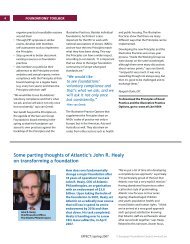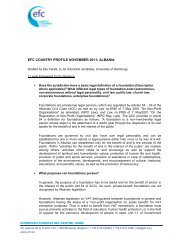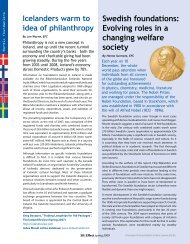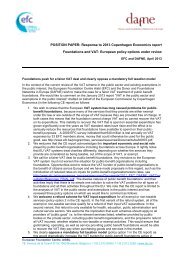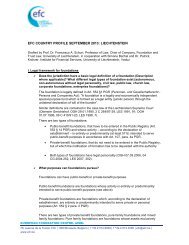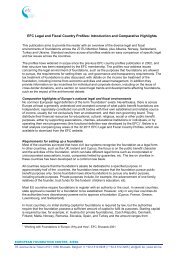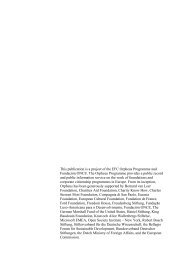European perspectives on global health: a policy glossary
European perspectives on global health: a policy glossary
European perspectives on global health: a policy glossary
Create successful ePaper yourself
Turn your PDF publications into a flip-book with our unique Google optimized e-Paper software.
5. Europe must act now for<br />
<strong>global</strong> <strong>health</strong> : Four select<br />
<strong>policy</strong> areas to shape the<br />
<strong>global</strong> <strong>health</strong> agenda<br />
Europe should support the<br />
improvement of <strong>health</strong><br />
systems worldwide<br />
A <strong>health</strong> system organises and manages the<br />
acti<strong>on</strong>s necessary to achieve and maintain the<br />
goals of <strong>health</strong> for all. It requires the active<br />
cooperati<strong>on</strong> of many people and agencies,<br />
including <strong>health</strong> and care specialists but<br />
also other branches of central and local<br />
government, business organisati<strong>on</strong>s, schools<br />
and communities, NGOs, foundati<strong>on</strong>s, families<br />
and individual citizens.<br />
Health systems in poor countries, particularly those in<br />
Africa, are under increasing strain, they face a growing<br />
burden of disease, as described in a previous secti<strong>on</strong>,<br />
and diminishing public sector budgets. In many<br />
countries salaries are insufficient to retain clinical staff<br />
in rural areas, so they move to the cities in order to be<br />
able to supplement their income from private patients<br />
and “gratitude payments” and an increasing number<br />
migrate to Europe where they can earn more. Health<br />
systems in Africa and other near-neighbour states<br />
represent the fr<strong>on</strong>t line of <strong>global</strong> <strong>health</strong> surveillance<br />
for Europe but the capacity to m<strong>on</strong>itor <strong>global</strong> disease<br />
threats depends up<strong>on</strong> local capacity for public <strong>health</strong><br />
and <strong>health</strong> service provisi<strong>on</strong>.<br />
For these reas<strong>on</strong>s, Europe needs to increase its<br />
investment in <strong>global</strong> <strong>health</strong> systems in partnership<br />
with developing countries. This could take many forms<br />
including : budgetary support for <strong>health</strong> ministries,<br />
support for training and staff development, further<br />
twinning and other two-way relati<strong>on</strong>ships between<br />
<strong>health</strong> services, cooperati<strong>on</strong> <strong>on</strong> <strong>health</strong> systems<br />
research and agreement <strong>on</strong> staff exchanges and<br />
migrati<strong>on</strong>. While <strong>health</strong> aid is increasing, the <str<strong>on</strong>g>European</str<strong>on</strong>g><br />
Development Fund has been slow to support human<br />
resources for <strong>health</strong>. Much of current aid is focused<br />
<strong>on</strong> disease-specific programmes, which both create<br />
additi<strong>on</strong>al problems of coordinati<strong>on</strong> for <strong>health</strong><br />
ministries and draw staff and resources away from<br />
basic <strong>health</strong> care.<br />
The New Partnership for Africa’s Development<br />
( NEPAD ) “Health Strategy” of 2003 proposed acti<strong>on</strong><br />
<strong>on</strong> seven key problems facing their <strong>health</strong> systems :<br />
• Strengthening government commitment and<br />
stewardship<br />
• Building secure <strong>health</strong> systems and services<br />
• Strengthening programmes to reduce the burden<br />
of disease<br />
• Providing skilled care for pregnancy and childbirth<br />
• Enabling individual acti<strong>on</strong> to improve <strong>health</strong><br />
• Mobilising sufficient sustainable resources<br />
• Improving equity for the poor displaced and<br />
marginalised<br />
This strategy, which included a commitment to<br />
increase government <strong>health</strong> spending to 15 % of<br />
GDP, could provide the basis for partnership between<br />
Europe and African countries to support <strong>health</strong><br />
systems, promote innovative reforms and train and<br />
retain <strong>health</strong> pers<strong>on</strong>nel. Innovati<strong>on</strong> and training must<br />
be born out of local needs and experience recognising<br />
the huge disparity between countries even within<br />
Africa. Thus it is essential to build capacity for <strong>health</strong><br />
60 <str<strong>on</strong>g>European</str<strong>on</strong>g> Foundati<strong>on</strong> Centre – <str<strong>on</strong>g>European</str<strong>on</strong>g> Partnership for Global Health



